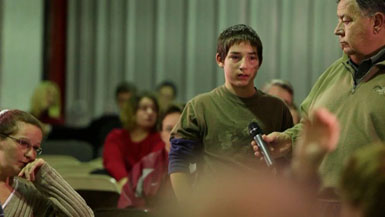Movie Review: Bully
A Great Documentary Should Be More Than A Tear Jerker
By Tom Houseman
If you've spent any time on the Internet, you've heard of the documentary Bully (and if you haven't spent any time on the Internet, how are you reading this article?). Harvey Weinstein made headlines when he went into battle over the film's R rating, as the MPAA felt that hearing 13-year-olds saying the F-word would be detrimental to the emotional and psychological well-being of 16-year-olds. Eventually the film was released in theaters without a rating, but with all the free publicity it could have wanted.
Lee Hirsch is a fairly accomplished documentary filmmaker who chose to make Bully in part because he dealt with the issue as a child. The topic of bullying has made quite a few headlines in recent years due to a rash of suicides by victims of bullying and the opportunity that the Internet and social networking have established for more creative ways for students to emotionally assault one another. Of course, anybody who went through middle school knows that bullying is a problem, even for those who were not the victims of physical abuse and round-the-clock Facebook tormenters. Bully seeks to bring all of these problems out into the open and force us to recognize how dangerous they are. While it is successful in that goal, it is far too limited by its structure and methods to approach the topic with the breadth and depth it needed to.
Bully's fatal flaw is its lack of ambition. Over the last decade there have been several great documentaries that tackled specific social issues. What makes a social issue documentary great is that it does not just show the problem but fully explores it, attempting to understand how the problem has evolved to its current point, where it is going from here, how it is viewed by society and what people are doing either to fight against it or to perpetuate it. Three of the best documentaries of this kind from recent years are Morgan Spurlock's Super Size Me, Michael Moore's Sicko, and Davis Guggenheim's Waiting for “Superman.” While Bully tackles a problem just as serious as those three do, it seems content to stay on the surface of its topic, never truly digging in to give it the complex exploration it deserves.
Bully follows different teenagers whose lives are being wrecked by bullying, as well as parents whose children committed suicide after years of being bullied. Each of these stories, from a boy who is constantly physically harassed, to a girl who has been ostracized by almost her entire town after coming out as a lesbian, to another girl who brought a gun onto her bus to scare her tormenters, is absolutely heartbreaking. Lee Hirsch could not have picked a more sympathetic, heartstring-tugging group of children for us to watch. It is impossible not to feel compassion, dismay, and anger while watching these children struggle to get through the day. We learn that their parents have no idea of the extent of the bullying that their children face and, more important, how little school administrators are doing to help. It is at times painful to watch.
How has this problem become so pervasive and so damaging to America's youth? Has bullying always been this bad, or has it gotten worse over the last few decades? Have there always been this many teen suicides, or has the media merely begun paying more attention to it? Is the blind eye we see administrators turning to the problem representative of all schools or is it specific to the people that we saw in the film? How has new media enabled bullying over which school officials have less power? These were some of the questions that I brought into the film, none of which were answered, or even addressed.
Most documentaries use personal stories as jumping off points for more in depth conversations about their issue, whether it is the fast food industry, health care, or failing schools. They interview people in charge and document the work that people are doing to solve the problem. They make us care, but then they show us how this problem has arisen and what is being done to fix it. Bully, by eschewing traditional documentary strategies of voiceover and interviews, never takes us past this first step. Administrators and politicians were frequently criticized, but rarely given a chance to speak in their own defense. Towards the end of the film we see an event held by a group formed by a man whose son committed suicide, but we do not see if they are attempting to make real change in the system or merely holding vigils and attempting to make bullying a more visible issue.
If you are the type prone to tears, a bottle of water is a necessity in order to get through Bully without suffering from massive dehydration. But if you are looking for a complex, multifaceted conversation about how bullying has evolved and why our culture has become so focused on it without really making any progress in stopping it, Bully is only the very beginning of a long conversation. Is Bully an important film? Only in that its subject is one worth talking about, a subject that still deserves a much more thorough exploration.




